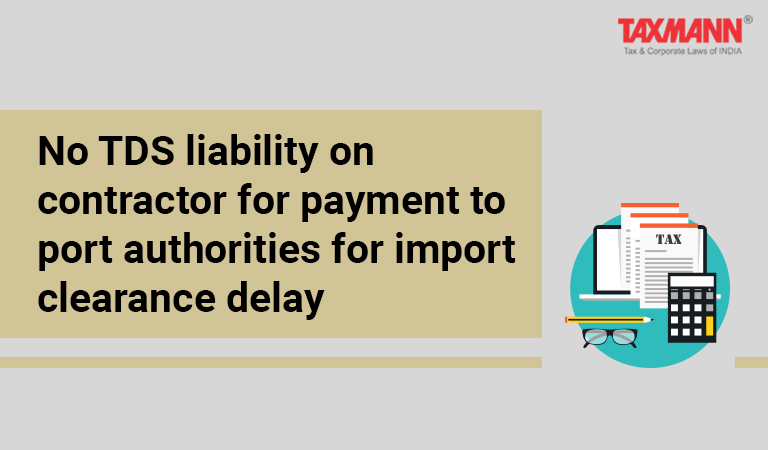No TDS liability on contractor for payment to port authorities for import clearance delay
- Blog|News|Income Tax|
- 2 Min Read
- By Taxmann
- |
- Last Updated on 19 December, 2022

Case Details: DCIT v. International Seaports (Haldia) (P.) Ltd. - [2022] 145 taxmann.com 403 (Kolkata-Trib.)
Judiciary and Counsel Details
-
- Rajpal Yadav, Vice-President & Girish Agrawal, Accountant Member
- Somnath Ghosh, Adv. for the Assessee.
- Sudipto Ghosh, CIT D/R for the Revenue.
Facts of the Case
Assessee-company engaged in the business of building, maintaining, and operating a berth for discharging cargo from incoming vessels at Kolkata Port Trust. During the year, the assessee handled the imported goods on behalf of a client and incurred railway siding charges and demurrage charges.
Such expenses were paid by the contractee client to the dock authorities but at the time of paying the contractual amount to the assessee, the contractee deducted the expenses incurred and paid the balance amount. The assessee claimed these expenses in the profit and loss account and filed the return of income.
During the assessment proceedings, the Assessing Officer (AO) contended that the above-claimed expenses were subject to tax deduction under section 194C. As tax was not deducted, AO disallowed the expenses in accordance with section 40(a)(ia) and computed the income accordingly. The aggrieved assessee filed an appeal before CIT (A).
On appeal, CIT (A) reversed the order of AO and allowed the assessee’s appeal. The matter then reached the Kolkata Tribunal.
ITAT Held
The Tribunal held that the contractual agreement between the assessee and client reveals that the assessee was bound to act as a handling contractor and any incidental charges will be the responsibility of the assessee. Such charges will be deducted from the final payment made to the assessee.
It was observed that the charges emerged out of the failure on the assessee’s part. It was required to complete the work within the prescribed time limit. Therefore, the client suffered damages due to the assessee, and ultimately pay for the contracted amount was made after deducting those charges.
In view of the legal maxim ‘impotentia excusat legam’ and ‘lex non cogit ad impossibilia’, law does not compel one to do that which one cannot possibly perform. Where the law creates a duty or charge and the party is disabled to perform it, without any default in him and has no remedy over it, there the law will, in general, excuse him.
In the instant case, assessee isn’t responsible for deducting tax at source (TDS) under section 194C on demurrage and railway siding charges that are charged by the Dock authorities on the contractee-importer (SAIL) for delayed clearance. These charges are deducted by the contractee-importer from the payments due to the handling contractor according to the agreement between the two parties.
Therefore, disallowance for non-deduction of TDS cannot be made under section 40(a)(ia) in relation to the debits made to the Profit and Loss account for these deductions made by the contractee from the bill.
Disclaimer: The content/information published on the website is only for general information of the user and shall not be construed as legal advice. While the Taxmann has exercised reasonable efforts to ensure the veracity of information/content published, Taxmann shall be under no liability in any manner whatsoever for incorrect information, if any.

Taxmann Publications has a dedicated in-house Research & Editorial Team. This team consists of a team of Chartered Accountants, Company Secretaries, and Lawyers. This team works under the guidance and supervision of editor-in-chief Mr Rakesh Bhargava.
The Research and Editorial Team is responsible for developing reliable and accurate content for the readers. The team follows the six-sigma approach to achieve the benchmark of zero error in its publications and research platforms. The team ensures that the following publication guidelines are thoroughly followed while developing the content:
- The statutory material is obtained only from the authorized and reliable sources
- All the latest developments in the judicial and legislative fields are covered
- Prepare the analytical write-ups on current, controversial, and important issues to help the readers to understand the concept and its implications
- Every content published by Taxmann is complete, accurate and lucid
- All evidence-based statements are supported with proper reference to Section, Circular No., Notification No. or citations
- The golden rules of grammar, style and consistency are thoroughly followed
- Font and size that’s easy to read and remain consistent across all imprint and digital publications are applied



 CA | CS | CMA
CA | CS | CMA
